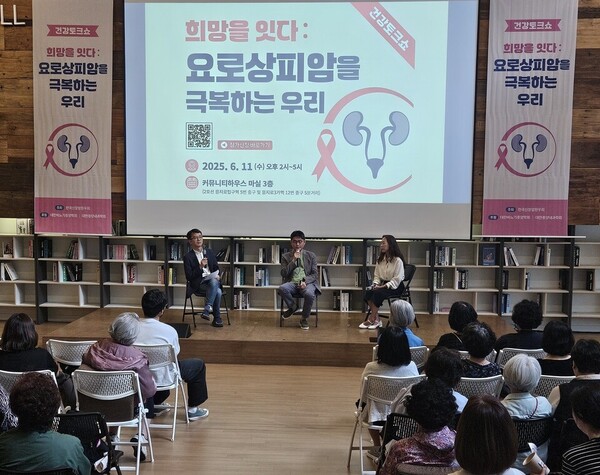Patients with urothelial carcinoma are increasingly abandoning treatment. New drugs are being developed, but health insurance coverage is slow to catch up.
No new drug has been approved for coverage in the last five years. In response, patients gathered together to share their grievances about the reality of urothelial cancer treatment.

The Korea Kidney Cancer Association held an event last Wednesday titled "Connecting Hope: We Overcome Urothelial Cancer," a health talk show for patients with urothelial cancer, the organization said Monday. It was the second event held since last year.
The event was organized following a survey of more than 100 urothelial cancer patients conducted on World Cancer Day in February, aiming to provide a platform for patients to share and acknowledge their pain points.
The results of the survey showed that Korean urothelial cancer patients take an average of more than six months from symptom to diagnosis and that seven out of 10 patients struggle with insufficient information and government support regarding urothelial cancer.
“One in 10 of our members are patients with urothelial cancer,” said Paik Jin-young, leader of the Korea Kidney Cancer Association, which organized the event. "Once urothelial cancer metastasizes, the mortality rate is comparable to that of lung cancer, and the prognosis is poor. However, the development of new drugs has been slow, and health insurance coverage has not progressed."
The fact that no new drugs have been approved for first-line treatment in the past five years shows how marginalized urothelial cancer is,” Paik said. "They are a minority, but their lives are equally precious. The government should not turn a blind eye to the voices of urothelial cancer patients."
Professor Kim In-ho of the Department of Medical Oncology at the Catholic University of Korea Seoul St. Mary's Hospital gave a lecture on “The Latest Treatment Trends and Issues in Urothelial Cancer” and pointed out the medical reality that treating urothelial cancer is challenging because new drugs are slow to be covered by health insurance.
For the past 50 years, the standard treatment for urothelial cancer has been platinum-based chemotherapy. It's an old cancer drug, but it's been around for a long time because there hasn't been a more effective drug, Professor Kim explained.
"The treatment landscape for urothelial cancer is much improved compared to 10 years ago. However, not all new drugs available for first-line therapy are covered by health insurance,” Kim said. “I've had patients resent me for not recommending them because of the cost, and I've also had patients who tried (treatment) but gave up because of the financial burden."
Professor Koo Ja-yoon of the Department of Urology at Dongnam Institute of Radiological and Medical Sciences emphasized the importance of early diagnosis of urothelial carcinoma.
“If bladder cancer is detected early, the prognosis and quality of life can be controlled,” Professor Koo said. “Unlike other cancers, early detection can change the treatment method and prognosis of cancer, so it is important to suspect bladder cancer if you see hematuria and go for a checkup.”
Jeong Byong-chang, president of the Korean Urological Oncology Society, and Park Joon-oh, president of the Korean Society of Medical Oncology, participated in the health talk show and said they would work to help new drugs for urothelial cancer enter the health insurance system.
“Our mission is to help patients and society with cancer treatment and medicine,” Park said. “We will work to ensure that new drugs are quickly available to patients.”
“Doctors and patients must go hand in hand to overcome urothelial cancer,” Jeong said. “I will explore what role physicians treating urologic tumors can play for patients and their families.”
Urothelial cancers include bladder, renal, and ureteral cancers. Bladder cancer is a representative cancer that accounts for more than 90 percent of urothelial cancers. According to the National Cancer Registry Statistics released last year, new cases increased by 44 percent from 3,655 in 2012, about 10 years ago. If bladder cancer metastasizes to other organs, the five-year survival rate plummets to 15 percent.
Related articles
- Astellas Korea names ex-Novartis exec Kang as head of medical affairs
- ‘Keytruda-Padcev combo attains 3-year survival in urothelial cancer, needing expanded coverage’
- Korea faces key decision on reimbursement for bladder cancer drugs Balversa and Padcev
- A paradigm shift in early-stage bladder cancer treatment is imminent
- Korea lags behind global standards in kidney cancer treatment, expert warns

